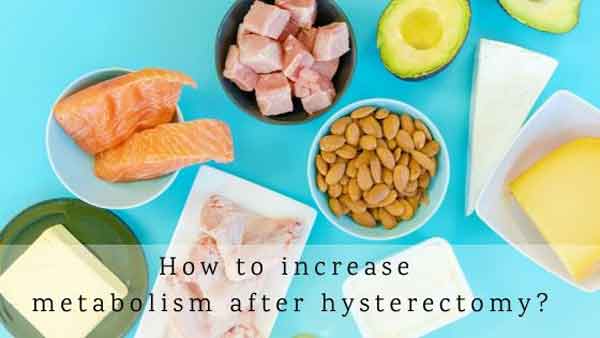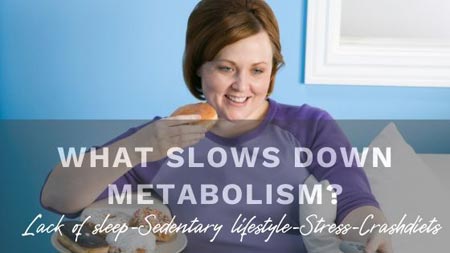How to increase metabolism after hysterectomy to get rid of belly fat?
I am convinced many women can relate to this. You are struggling to maintain a healthy weight after your hysterectomy, and you believe this is because of a sluggish metabolism. If you want to know why this happens and how to increase your metabolism after a hysterectomy, keep reading. In this post, we’ll explore the reasons behind this metabolic slowdown and share practical tips to help you boost your metabolism and achieve your health goals. Let’s dive into the science and strategies that can make a real difference in your journey to a healthier you.

This blog is reader-supported. When you buy through a link on our site, we earn a commission at no extra cost to you. Read more
The benefits of a faster metabolism are:
- You burn more calories.
- It is easier to lose and maintain a healthy weight.
- It will give you more energy, and you feel better.
How does human metabolism work? The basic metabolic rate (BMR) is the body’s energy for life-sustaining bodily functions. This means how many calories you burn when you are at rest. In this resting stage, we burn most of our energy, and the rest is used for digesting food and physical activity. How your BMR responds is unique for each individual and depends on several factors.
- Gender
- More or less body fat
- Hormones
- One’s age
- Genetics
Some women are “blessed” with a fast metabolism and can eat whatever they want without gaining an ounce.
Why does our metabolism slow down as we age?
Metabolism is the process of breaking down food and turning it into energy. Your body can then use the energy or store it in liver cells, muscle cells, or subcutaneous body fat.
All cells in the body change as we age and slowly lose functions. This is also true for the cell structures (mitochondria) that turn food into usable energy. This is why our metabolism slows down after the age of 40. You can expect your metabolism to decrease by 5% every ten years. Luckily, all is not lost; we can do a lot to reverse this process and fire it up again.
Find your Basal Metabolic Rate (BMR)
You must first find your unique numbers to know how to increase metabolism after hysterectomy. You can only lose weight when your caloric intake is less than your caloric needs based on your BMR.
The calculator on this page can help you find your BMR and the calories you need daily to maintain your weight.
Another way, though this takes more time, is to track what you eat in a food journal. Writing down what you eat for a whole week will give you insight into your daily calorie intake. You can use a simple notebook or a food/calorie tracking app such as Fatsecret.

How to increase metabolism after hysterectomy for weight loss
Knowing how many calories you consume daily is a good starting point for any weight loss plan. By reducing this amount of calories, you naturally burn throughout the day and lose weight. By reducing calories, we don’t mean that you starve yourself. Crash diets can cause your metabolism to drop up to 20% because the body will go into its defense mode, trying to conserve energy.
If you have ever tried to lose weight, you may have noticed how easy it is to lose the first few pounds. However, this process slows down when you have lost some weight and are closer to your target weight. Your basal metabolic rate decreases as you weigh less, and your body needs fewer calories for its basic functions.
Which foods increase metabolism after hysterectomy and burn fat?
Besides your resting metabolism and physical activities, your body also burns calories when you eat. TEF is the thermic effect of food: the number of calories your body needs to digest, absorb, and process the food you eat. The TEF of some foods is higher as they are harder to process than other foods and may increase your metabolism after hysterectomy.
High protein diet
For example, the energy required to digest protein is 15 – 30%, while the thermic effect of fat is only 0–3% and 5–10% for carbs. So, including more protein-rich foods will give your metabolism a boost. This study shows that eating protein reduces ghrelin production, the appetite-stimulating hormone, making you feel less hungry. Moreover, consuming more protein makes you likely to eat fewer low-quality carbs.
When on a high-protein diet, choose the proteins you eat with care. Animal products are rich in protein, contain high levels of saturated fats and cholesterol, and can increase your risk of heart disease. Fish and vegetables like soy, beans, tofu, and nuts are healthier protein sources. Keep in mind that overeating protein may harm your kidneys.
Plus, not all protein is used for energy. The body converts the rest to glucose (via gluconeogenesis) and stores it as glycogen and fat.
Eat spicy food to increase metabolism after hysterectomy
This is for you if you love foods and recipes with red or green chili peppers. Some studies have shown that spicy foods increase metabolic rate and decrease appetite. When eating spicy food, the body will generate excess heat just as it would with intense exercise. Eating a spicy meal may increase your metabolism by about 8%, a relatively small percentage. Nonetheless, it will give your metabolism a temporary boost. Not to forget, eating more spicy food will make you eat slower, giving your brain the signal it’s full of less food.
Best drink to boost metabolism
Drink more water to increase metabolism after hysterectomy
Would you believe that water can increase your metabolism? According to a study published in the Journal of Clinical Endocrinology and Metabolism, water can boost the metabolic rate in both men and women by 30%. The effects on metabolism were detected within 10 minutes after water intake and reached the maximum after 30 to 40 minutes. The researchers estimated that drinking an additional 6 cups of water daily can increase the resting metabolism by roughly 50 calories (200 KJ) daily.
Does green tea increase metabolism?
You see it everywhere; these claim that green tea is the miracle cure for weight loss. Green tea contains caffeine and catechins, which can increase metabolism and fat oxidation. However, it raises the metabolic rate only to a small degree. Indeed, it is not enough to make a significant difference for an obese person who wants to lose weight.
Conversely, researchers at Penn State’s College of Agricultural Sciences discovered that when mice on a high-fat diet were given decaffeinated green tea extract combined with regular exercise, their body weight and health improved considerably.
So, combining green tea drinking and exercise appears to be a promising solution for decreasing body weight. However, new research is needed to confirm the beneficial effect on humans.
Does coffee increase metabolism
Coffee contains several stimulants, like caffeine, theobromine, theophylline, and chlorogenic acid. Caffeine is the most potent, and apart from speeding up your metabolic rate, it also makes you feel more energized. Moreover, after the liver breaks down, it helps mobilize fat from the fat tissues. Remember that what you put in your coffee (cream or sugar) may add extra calories and prevent you from reaping the benefits of coffee’s metabolism-boosting effect.
What slows down metabolism?

Lack of sleep
Sleep deprivation dramatically impacts the metabolism of glucose and hormones that regulate your appetite. Poor sleep affects two essential hormones, Ghrelin and Leptin. Lack of sleep will increase your hunger hormone Ghrelin and cause you to produce less Leptin, suppressing hunger. Consequently, you will have an increased appetite and may put on weight. Moreover, chronic sleep deprivation may increase one’s risk of obesity and diabetes.
Spending most of the time sitting
A sedentary lifestyle will slow down your metabolism. Prolonged inactivity may harm your health. The body will lose its ability to mobilize fat from the fat cells and adequately use its insulin. Moreover, you will store more fat throughout the body and lose valuable muscle tissue. So if you spend many hours working at a desk, including some activity in your daily routine is crucial.
Related post: Transformative Weight Loss Workouts For Women Over 50 – Try This 7-Day Plan
Stress
When you are stressed, your body produces more cortisol than usual. Cortisol is a hormone that may initially increase metabolism, but if the stress continues, it can make you very hungry. So chronic stress can lead to over-consumption of unhealthy food and cause weight gain.
Besides, stress often causes sleep deprivation. And as we already mentioned, this may slow down metabolism.
Going on a crash diet
With crash diets, people often reduce their calorie intake way below their BMR. In most cases, these diets have the rebound effect of severe food cravings that result in binge eating. You’ll likely not see the desired weight loss because these diets are hard to stick to longer.
Increase metabolism after hysterectomy with a Metabolic diet
As you can see, what you eat and drink significantly impacts your metabolism. Metabolic cooking is a great way to increase metabolism after hysterectomy.
Master Your Metabolism
Jillian Michaels’ extraordinary diet bestseller, Master Your Metabolism, has helped millions lose weight and get healthy without paying attention to their diets or exercise routines. By following the plan, readers learn the natural way to balance hormones so their bodies can burn fat, become energetic, and thrive.



